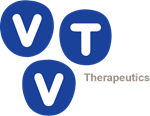Shareholder Tools
Press Release
View printer-friendly version << Back
vTv Therapeutics to Present Additional Positive Clinical Study Results from Phase 2 Simplici-T1 Study of TTP399 as Adjunctive Therapy for Patients with Type 1 Diabetes at EASD Virtual Meeting
In
Details of the EASD virtual presentations follow:
Oral Presentation Title: “The Simplici-T1 Trial: Activation of Glucokinase by TTP399 Improves Glycaemic Control in Patients with Type 1 Diabetes”
Presentation Number: 50
Category: OP 09 Novel Agents in Type 1 Diabetes
Date and Time: Tuesday, September 22, 2020,
Oral Presentation Title: “Mechanism Matter: Preliminary Evidence That Activation of Glucokinase by TTP399 Does Not Increase Plasma or Urine Ketones in Type 1 Diabetes”
Presentation Number: 51
Category: OP 09 Novel Agents in Type 1 Diabetes
Date and Time: Tuesday, September 22, 2020,
About the Simplici-T1 Study
Simplici-T1 was a multi-center, randomized, double-blind, adaptive study assessing the safety and efficacy of TTP399 as an adjunct to insulin therapy in adults with T1D. The primary endpoint was the change in HbA1c at week 12. The study was conducted with support from JDRF, the leading global organization funding research in type 1 diabetes.
This Phase 2 learn-and-confirm study was conducted in two parts under a treat-to-target protocol to evaluate the safety and efficacy of TTP399 in T1D patients over 12 weeks of daily dosing following a multi-week insulin optimization and placebo run-in period. Part 1 enrolled 19 patients on both insulin pumps and CGMs. The positive topline results from the learning phase - Part 1 were reported in
About Type 1 Diabetes
Type 1 diabetes is an autoimmune disease in which a person’s pancreas stops producing insulin, a hormone that enables people to get energy from food. It occurs when the body’s immune system attacks and destroys the insulin-producing cells in the pancreas, called beta cells. While its causes are not yet entirely understood, scientists believe that both genetic factors and environmental triggers are involved. Its onset has nothing to do with diet or lifestyle. There is nothing you can do to prevent T1D, and—at present—nothing you can do to cure it.
About
Forward-Looking Statements
This release contains forward-looking statements, which involve risks and uncertainties. These forward-looking statements can be identified by the use of forward-looking terminology, including the terms “anticipate,” “believe,” “could,” “estimate,” “expect,” “intend,” “may,” “plan,” “potential,” “predict,” “project,” “should,” “target,” “will,” “would” and, in each case, their negative or other various or comparable terminology. All statements other than statements of historical facts contained in this release, including statements regarding the timing of our clinical trials, our strategy, future operations, future financial position, future revenue, projected costs, prospects, plans, objectives of management and expected market growth are forward-looking statements. These statements involve known and unknown risks, uncertainties and other important factors that may cause our actual results, performance or achievements to be materially different from any future results, performance or achievements expressed or implied by the forward-looking statements. Important factors that could cause our results to vary from expectations include those described under the heading “Risk Factors” in our Annual Report on Form 10-K and our other filings with the
Contact
Investors:
CDavis@LifeSciAdvisors.com
Source: vTv Therapeutics Inc.
Investor Overview
- Investor Overview
- Stock Information
- Financial Information
- News & Events
- Corporate Governance
- Shareholder Services
